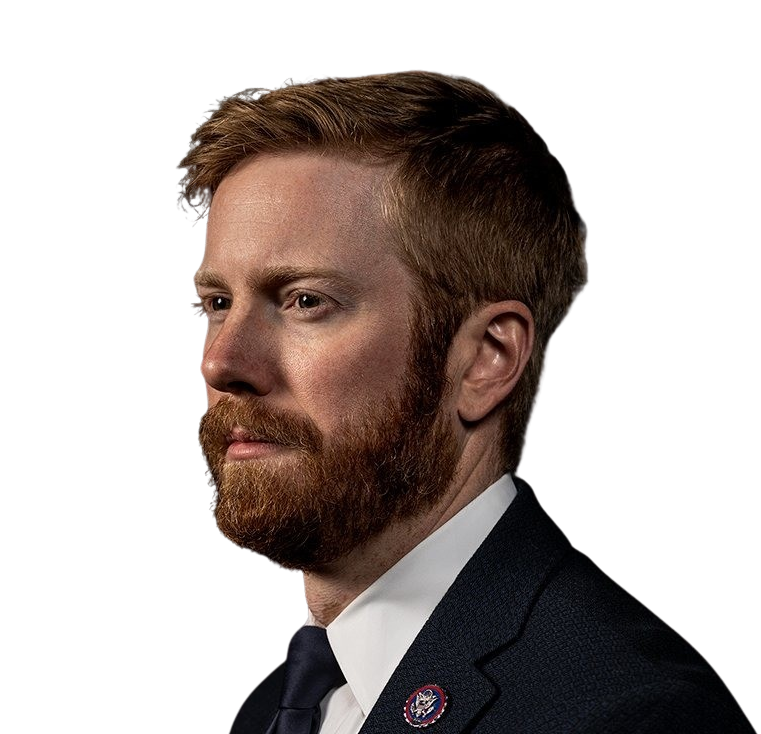For the first installment of a multi-part series profiling each of the Institute of Politics’s (IOP) Pritzker Fellows for the winter and spring quarters, The Maroon spoke with former Republican representative Peter Meijer (R-MI) about his experience in the military and his career in politics.
Meijer attended the United States Military Academy at West Point for one year before transferring to Columbia University, where he graduated with a degree in Cultural Anthropology in 2012.
Meijer served in the United States Army Reserve from 2008 and 2016. During his tenure, he was deployed to Iraq from 2010 to 2011, where he served as an intelligence adviser. After leaving the Reserve, he graduated from the New York University Stern School of Business with an M.B.A. in 2017.
Meijer then served as the representative for Michigan’s third congressional district from 2021 to 2023. He was inspired to become an IOP Pritzker Fellow after speaking at an IOP panel with then– freshman first-year representative and military veteran Jake Auchincloss (D-MA) in spring 2022.
Excited to learn from the University of Chicago student body while simultaneously instructing them, Meijer shared his perspective on the importance of having the opportunity to connect with professionals throughout his own college experience.
“I think back to my undergraduate days, and there was just something about being immersed in the realm of ideas that is patently different from having some of that hope and curiosity kind of beaten out of you through professional reality for decades,” Meijer said. “That, I think, is incredibly valuable.”
Meijer believed his military service in Iraq provided him with a unique perspective on the inner workings of the United States’ political sphere. He acknowledged that this experience helped fuel his fierce belief in upholding integrity by being direct about the extent of his knowledge.
“When I started off at West Point, we had four answers. ‘Yes, sir, Yes, ma’am; no, sir; no, ma’am; I don’t know, sir; I don’t know, ma’am; no excuse, sir; and no excuse, ma’am.’ I think it’s important to be very clear, and that’s something that elected officials and politicians just so rarely say, and it’s something government officials, appointed officials, bureaucrats, experts, academics, never say,” Meijer said.
Meijer pointed to the pandemic to prove his point. “Instead of saying, ‘listen, there’s a lot we don’t know, but at this point, we think this is the best, but we’ll reevaluate that when we have different ideas,’ it was black-or-white responses that then give very little wiggle room or little room to maneuver when things change.”
Meijer then elaborated on how this mentality crosses party lines and how valuing this strategy can often become clouded by intense political polarization.
“If a Democrat is doing a policy that is in line with [my beliefs], even though they’re a Democrat, I support it,” he said. “If a Republican does something that is in opposition to [these beliefs], I will reject it, even if I’m a Republican. That’s sort of a consistent throughline. But instead of having that, it becomes everything boiled down to whatever the other party does, no matter if it’s something I’ve supported in the past or I am in objection to. I think that instills among voters and constituents a sense that none of these people actually believe anything, [and] that they are all opportunists. I think that’s just really destructive for the body politic.”
Meijer attested to understanding the political strategy behind supporting party initiatives, even if it runs counter to personal belief. However, he described the negative divide that a blind party following can create.
“At the same time, I get why they’re doing that. It’s easy, you can fundraise and get attention. It’s really hard to sit there and say, ‘Well, actually, guys, you know, the thing you’re criticizing Biden for Trump did, or when Trump did it, now that Biden is doing the same thing, you’re objecting. You were voting against that bill, when you’re in the minority, but now that you’re in the majority, it’s the exact same bill, but supported by your side and not theirs, and you’re in the opposite direction. That kind of flip-flopping relativism, I think, just breeds a sense of cynicism and pessimism that is ultimately very counterproductive.”
After being honorably discharged from the military in 2011, Meijer remained involved in veteran affairs, serving as the Chairperson of the Board of Student Veterans of America from 2009 to 2019.
In 2017, Meijer began working as an advisory board member for With Honor Action, an organization dedicated to fighting political polarization by empowering more veterans to run for office.
Meijer ran for Michigan’s third Congressional district in 2019 as a Republican and narrowly defeated Democratic nominee Hillary Scholten 53 percent to 47 percent. With regard to his transition into politics, he remarked, “From a veteran trajectory standpoint, mine was highly unorthodox and unique. But I mean, in reality at every stage, my perspective was [about] how I can take the experiences that I have, some of the skills that I’ve gained, and apply them. What is the best avenue or the best outlet? Then, [after] having gone from petitioning Congress and advocating on veterans’ issues to working with candidates for federal office and elected officials, when the opportunity came to throw my own hat in the ring and take that plunge, it was hard to resist.”
Shortly after taking office, Meijer discovered that there is a significant challenge in drawing the line between making concrete decisions and reassuring voters that their faith has been placed in the right candidate.
“You can be confident while at the same time accurately expressing what you know, and what you don’t know,” he said. “That’s not a weakness, that is accurate. And to my earlier points, it’s okay to say you don’t know, but at the same time project that you are on the path to figuring it out, or you’re doing what the situation requires.”
Meijer also acknowledged the differences but also the interconnectedness between a politician and a leader. “Folks who over-index the leadership over political reality will not be in that role for very long,” he said. “People who over-index being a politician over having a set of principles and values can be in that role for a very long time, but then they’re just, you know, they’re surfers, right? They’re just being carried along on the current. They’re a volleyball bobbing in the ocean right there, just getting carried out with the tide carrying him with the tide getting blown around. And then you don’t have any agency, right? You’re a vessel. You’re not actually making a difference. You’re just becoming part of the blob.”
However, he recognized that resisting the compromising of morals for the sake of re-election is a challenge that many politicians face throughout their careers. Meijer recalled colleagues who had received votes and voted for policies they themselves did not fully believe in, solely because they feared not being re-elected. Despite facing pressures of his own to give in to a particular side or interest group, Meijer reasserted his pride in upholding his personal values.
“The challenge in Congress is that each of those little concessions add up to a death by a thousand cuts, and as you start to go down that path, I think you’re tempting the political equivalent of a midlife crisis,” Meijer said. “It’s the people who did things in order to win that have to stay where they are because, you know, they have debates themselves, broken relationships, betrayed individuals, or just shown a lack of character that will not soon be forgotten. Those are the folks who are limiting their opportunities ultimately, especially if you’re young.”
With regard to his legacy as a Pritzker Fellow at the IOP, Meijer hopes to elucidate the priorities of a good politician and the ways in which they pursue a plan to solve the most pressing issues of society, such as the need to improve bipartisanship in policymaking.
“Often, there’s a lot of focus on what the problem is. There’s usually not a focus on whether or not this proposed solution is a solution, let alone understanding how that problem came to be in the first place,” Meijer said. “That’s where I see the most hope for us to make things work better. It’s not about picking apart and going to partisan sides when we already agree on what the problem is.”















